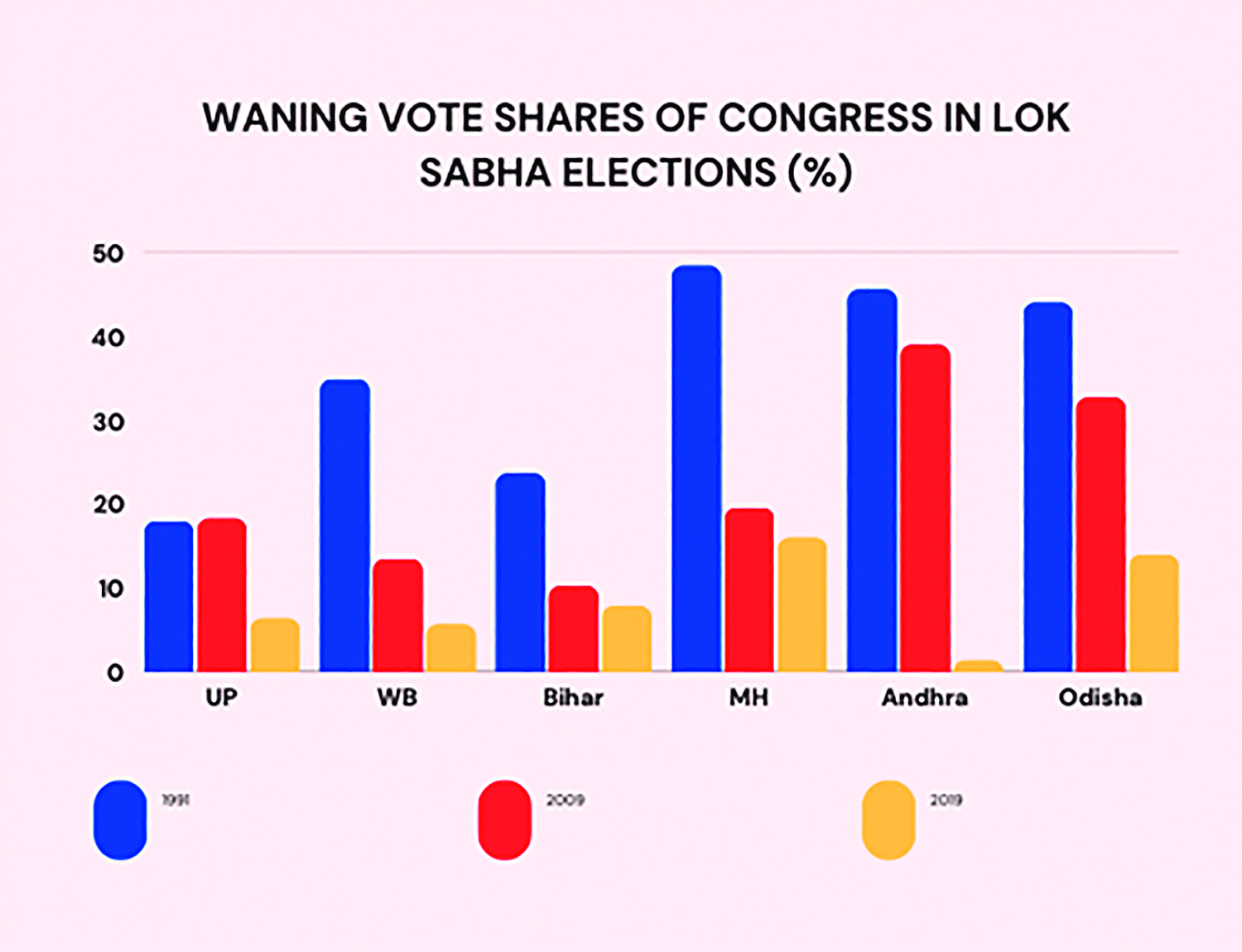The Congress managed a 1.4% vote share in Andhra Pradesh in 2019. How does one recover from that kind of debacle?
When campaigning for elections starts peaking, even seasoned analysts tend to fall prey to rhetoric, polemics and acrimonious controversies, apart from anecdotal field reports that seek to highlight the way the “Hawa” is blowing. It is no different this time. There has been a lot of focus on the allegations of Prime Minister Narendra Modi that the Congress party singles out the Muslim community for vote bank politics and appeasement. There has also been a lot of focus on allegations of I.N.D.I Alliance leaders that the BJP is blatantly misusing agencies like the Enforcement Directorate, Central Bureau of Investigation and the Income Tax Department to defang and cripple opposition leaders and parties. Amidst all this, the close to 3% drop in voter turnout in the first two phases of voting has triggered much punditry and speculation over how this could help or hurt the BJP. Finally, there are inflammatory remarks by leaders of all political parties that make partisans attack other with ferocity.
Amidst all this, as mentioned at the beginning, even seasoned analysts tend to shift focus from the big picture. What is the big picture? It has been crystal clear to students of politics in India for years that the ability of opposition parties to defeat Narendra Modi in the 2024 Lok Sabha elections hinges on the Congress getting as close to 150 seats as possible.
The party had won 44 seats in 2014 and 52 in 2019. It has also been analysed ad nauseam that the Congress has to win a lot of seats in the central
This point has been emphasised so many times by a slew of analysts, commentators and pundits that the authors would not repeat them. What they want to highlight in this column is another big picture: the gradual yet seemingly irreversible crumbling of the Congress as a national force. Even in 2014 and 2019 when the party was annihilated by the Modi juggernaut, the Congress could boast of a national vote share of close to 20%. There was still hope. After all, under Sonia Gandhi in 2004, the Congress had managed to win 145 seats (138 for the BJP) and cobble together the UPA regime by getting a 26% vote share. A concerted and sustained revival strategy, it was argued, could once again take the party from a 20% to a more than 25% vote share. It was this argument that has made legions of liberal, progressive and secular critics of Modi to nurse fond hopes of a 2004 repeat in 2024. But odds are that such fond hopes will remain fond hopes.
For a moment, forget the seats and states like Rajasthan, Gujarat, Chattisgarh et al where the Congress is in bilateral contests with the BJP. The authors have consciously decided to pick half a dozen states where regional parties are a force to reckon with. A data analysis of these six states from 1991 to 2019 indicates that the Congress is simply withering away from large sections and corners of India to a point where only a miracle can revive fortunes. These six states are Uttar Pradesh, West Bengal, Bihar, Maharashtra, Andhra Pradesh and Odisha.
In almost all these states, the Congress had vote shares during Lok Sabha elections upwards of 35% in 1991.
In Uttar Pradesh and Bihar, the withering away had started in 1991 itself. Just look at the chart and draw your own conclusions. Uttar Pradesh has SP, Bihar has RJD, West Bengal has TMC, Maharashtra has Shiv Sena and NCP, Andhra has YSR Congress and TDP, and Odisha has BJD. Together, these six states send 256 members or nearly half of the total to the Lok Sabha. The Congress had won 87 seats of these in 1991. That in itself revealed the decline of the Congress. But look at how things have panned out since 1991 by analysing vote share data in these six states in 2009 and 2019.
There was a false dawn in 2009 for the Congress as its vote share increased and it won 21 seats in Uttar Pradesh. In many ways, this was the last hurrah for the Congress as it managed to win 91 seats. One can say that Sonia Gandhi had successfully arrested the steady decline of the Congress. But come 2019 and the decline looks visibly stark and terminal. In the 2019 Lok Sabha elections, the Congress won a meagre 9 out of these 256 seats. More important, look at the crumbling vote shares. Take Odisha for instance. From 44% in 1991 to 34% in 2009, the Congress vote share collapsed to 14%. In West Bengal, the collapse has been even more dramatic, from 34.9% in 1991 to 5.7%. In all these six states, the duel is between the BJP and powerful regional parties as the Congress slinks into irrelevance.
In less than a month, we will all know the extent to which the Congress has managed a revival in these six states. But just contemplate the mountains the party has to climb. The Congress managed a 1.4% vote share in Andhra Pradesh in 2019. How does one recover from that kind of debacle? That’s the real big picture: the withering away of the Congress as a national force. Politics hates a vacuum. It would be interesting to observe the emergence of a strong opposition force in the coming decade.
Yashwant Deshmukh is Founder & Editor in Chief of CVoter Foundation and Sutanu Guru is Executive Director.

